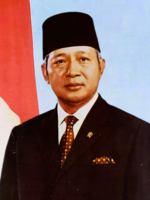
The Commission of Four (Indonesian: Komisi Empat or Komisi IV) was an Indonesian anti-corruption commission which existed from January to July 1970. Created by President Suharto following student protests and criticism from the press over corruption in Indonesia, the Commission was charged with reporting on the problem of corruption and providing recommendations to the government. Its membership consisted of four respected politicians — Wilopo (who also served as chairman of the Commission), I. J. Kasimo, Herman Johannes, and Anwar Tjokroaminoto — together with former Vice President Mohammad Hatta as an advisor to the Commission and Sutopo Juwono as its secretary.
Background
editEstablishment
edit
The Commission of Four was established through Presidential Decree Number 12 of 1970. The Presidential Decree contained two considerations for the formation of the Commission of Four. "That all efforts to eradicate corruption can run more effectively and efficiently..." and "...It is necessary to form a commission that is considered adequate."[1]
Membership
editNatsir cabinet
edit| Position | Portrait | Name | Party | Term | ||
|---|---|---|---|---|---|---|
| Took office | Left office | |||||
| Prime Minister | Mohammad Natsir | Masyumi | 6 September 1950 |
27 April 1951 | ||
| Chairman | Member | Member | Member |
|---|---|---|---|
| Wilopo Chairman of the Supreme Advisory Council |
I. J. Kasimo Member of the Supreme Advisory Council |
Herman Johannes Member of the Supreme Advisory Council |
Anwar Tjokroaminoto Member of the Supreme Advisory Council |
Dissolution
editAfter six months of work, Commission Four revealed its work report to the president. But the president did not immediately announce the report to the public. The president promised to announce it on August 16, 1970.[1]
See also
editNotes
editReferences
edit- ^ a b c Hanggoro, Hendaru Tri (11 December 2018). "Pemberantasan Korupsi Setengah Hati Rezim Orde Baru" [Half-Hearted Corruption Eradication of the New Order Regime]. historia.id (in Indonesian). Retrieved 6 September 2024.
{{cite web}}: CS1 maint: url-status (link) - ^ Hanggoro, Hendaru Tri (31 December 2018). "Empat Kasus Korupsi Besar pada Awal Orde Baru" [Four Big Corruption Cases during the Early New Order]. historia.id (in Indonesian). Retrieved 6 September 2024.
{{cite web}}: CS1 maint: url-status (link) - ^ Firdausi, Fadrik Aziz (18 April 2017). "Jatuh Bangun Lembaga Pemberantasan Korupsi" [Rise and Fall of Anti-Corruption Institutions]. historia.id (in Indonesian). Retrieved 6 September 2024.
{{cite web}}: CS1 maint: url-status (link) - ^ Mackie, J. A. C. (1970). "The Commission of Four Report on Corruption". Bulletin of Indonesian Economic Studies. 6 (3): 87–101. doi:10.1080/00074917012331331728. ISSN 0007-4918.
- ^ Smith, Theodore M. (1971). "Corruption, Tradition and Change". Indonesia (11): 21–40. doi:10.2307/3350742. ISSN 0019-7289.
- ^ Matanasi, Petrik (11 October 2021). "Coba-Coba Memberantas Korupsi di Era Orba Lewat Komisi Empat" [Attempts at Eradicating Corruption in the New Order Era through the Commission of Four]. tirto.id (in Indonesian). Retrieved 6 September 2024.
{{cite web}}: CS1 maint: url-status (link)